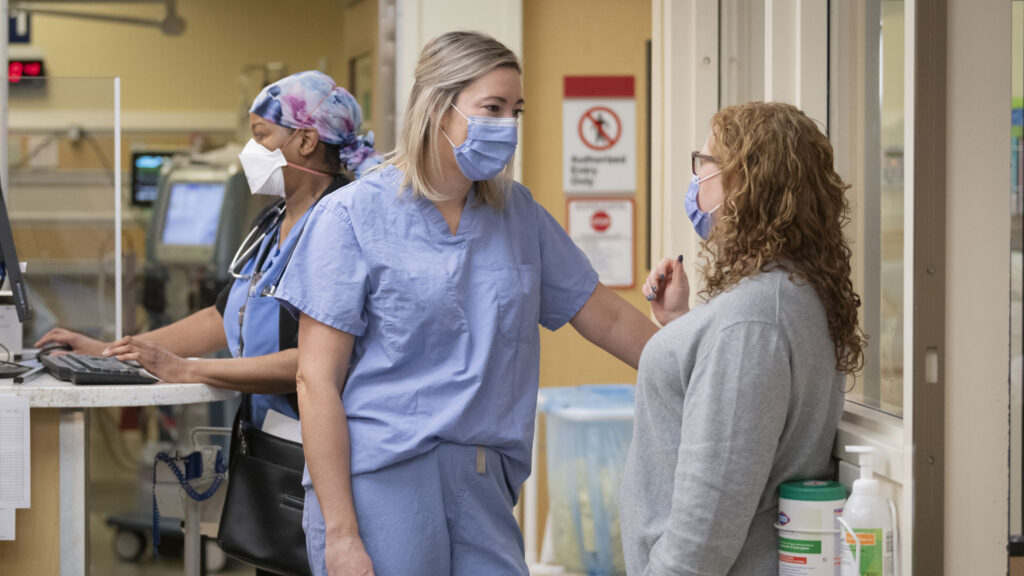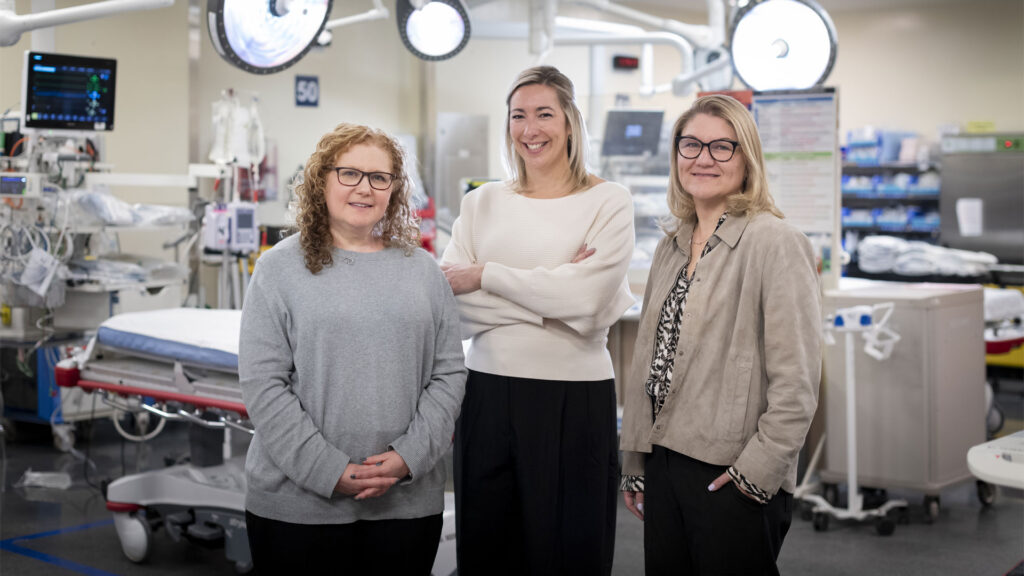Toronto’s Sunnybrook Health Sciences Centre (Sunnybrook) says its investment in leadership development programs is cultivating a strong leadership pipeline, with benefits that ripple throughout the workplace, and ultimately enhances outcomes for patients.
Leadership development has always been a priority for the large urban teaching hospital, which has more than 10,000 employees across 10 sites, and has been especially important in the post-COVID-19 pandemic environment, Kristen Winter, Sunnybrook’s Executive Vice-President, Programs, People and Leadership, said in a recent interview.
The pandemic led to a leadership vacuum when its challenges led experienced leaders to retire or leave the profession, she said. “It’s important for organizations to develop and nurture a new generation of leaders, who can navigate the complexities of health care and lead their teams with confidence and resilience.”
“Coming out of the pandemic, we see a younger generation that really strives to do things with purpose. They’re asking, ‘why are we here and what are we doing?’ ” Winter said. “We’ve got a ton of new leaders and I want them and our existing workforce to see the potential of where they can go in their careers – to feel this is a career not a job. We’re making sure they can be the best versions of themselves by giving them the knowledge, skills and confidence to be great leaders.”
Through Sunnybrook’s Leadership and Succession Planning Strategy, leaders and emerging leaders – in clinical and non-clinical roles – can access four formalized leadership programs. There are workshops and seminars offered through two in-house programs, covering topics such as effective communication, leading through change, fostering collaboration in conflict, spotting talent and adapting to a shifting context. A combination of classroom learning and personalized career plans are also offered externally through programs run by the University of Toronto’s Rotman School of Business and Western University’s Ivey Business School.

From left, Steffanye Michaelson, Marley Gimblett and Kristen Winter are photographed at Sunnybrook Health Science Centre in Toronto, On. April 2, 2024. (Photo by Kevin Van Paassen/Sunnybrook)
Winter said she began the process of identifying good candidates for leadership development by asking each member of Sunnybook’s senior team to think about a succession plan for their own role. Next, she asked each director to identify their rising stars, those who had both potential and interest in becoming leaders. The process also helped shed light on where the gaps in the overall succession plan lay.
The programs are evaluated by those who take them, and when necessary they are modified based on that feedback. Leaders can ask for new courses to be developed as areas for growth and learning emerge.
The response has been overwhelmingly positive, Winter said, and is showing results. Where once the hospital was losing staff faster than it was able to hire them, Winter describes the hospital’s current retention rate as “hiring one and retaining more than one.”In just four years, almost half of the more than two dozen participants in the Rotman program alone have been promoted to new roles.
Sunnybrook’s leadership strategy goes beyond formalized training, offering opportunities for mentorship, collaboration and feedback. It fosters an environment where junior leaders are empowered to make decisions and take risks. They learn from senior leaders who ideally model empathy, resilience, creativity and agility – behaviour and skills junior leaders are then encouraged to emulate in their own roles.
“It’s really about building compassionate and empathetic leaders,” said Winter. “When our frontline staff have a better culture to work in, they are able to give better patient care.”
Steffanye Michaelson, Director of Operations for Sunnybrook’s Odette Cancer Centre Patient and Family Support Program, began her career at Sunnybrook 25 years ago as a bedside nurse in the hospital’s oncology program. After moving to the Emergency Department she selected career opportunities including Staff Nurse, Charge Nurse and then Clinical Care Leader before getting her first taste of leadership on one of the hospital’s medicine floors.
“It’s from there I knew leadership was for me and, yes, this is where I want my career to go,” Michaelson recalled. She has gone on to take many of Sunnybrook’s leadership programs including those at Rotman and Ivey.
“Sunnybrook invests in people and their ability to foster great leaders through these programs,” Michaelson said. “I have never left because they’ve invested in me. I feel valued. If I feel invested in, I invest in my team. I do believe that trickles down to staff. All the things I’ve learned, I pass on when I mentor someone else.”
Marley Gimblett, a Registered Nurse working as a Clinical Care Leader in the busy Emergency Department of Sunnybrook, hasn’t directly taken any of the leadership courses offered to senior staff. But she knows she is a better nurse because of the environment the hospital’s management courses create.
She can do her best clinical work when she feels supported, and that means her patients get the best care possible.
“When we have good leaders, it totally benefits patients,” Gimblett said. “We feel more confident to advocate for them and to clearly communicate with the physicians and other members of the health care team to ensure they are getting the best care they deserve,”
Gimblett said the culture at Sunnybrook is what keeps her coming back.
“COVID did not help with retention, that’s for sure. Having these positive leaders influence our careers who are personable and approachable, means you’re able to have conversations when you need help. You feel so comfortable and safe in those spaces. I commute to work over an hour. I keep going back because of the people I work with and work for,” she said.
Winter said investing in leadership to address retention is an approach that attracts attention when she talks about it. When she posted about Sunnybrook’s leadership strategy on LinkedIn, she “got a ton of interest from hospitals” of all sizes, though some wondered whether they could afford to invest in something similar.
“I say, ‘how can you afford not to?’ ” Winter said. “Our biggest value is people. If you create a positive environment or culture for people to thrive in the job they are doing, then everybody wins.”
Photos by Kevin Van Paassen/Sunnybrook
